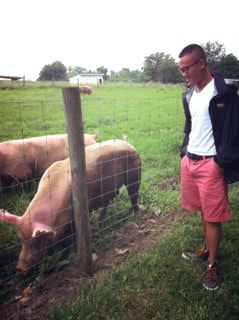|
So this paper was actually the second that Dr. Sheppard and I published together on the black soldier fly. I thought I would share it for those that might not have seen it. www.bioone.org/doi/pdf/10.1603/0022-2585-39.4.695 Let me know if the link works or not. This paper outlines colony maintenance of the black soldier fly. The main factors to consider are temperature (27-30C), humidity (70% or higher is great), and access to good sunlight (unless you use artificial lighting- to be discussed later). Funny story about this paper- Dr. Sheppard had me trudge waste deep through chicken manure, under a flock of layers (egg-laying chickens) that are literally raining manure down on me, to collect larvae that we would bring back to the lab as startup material for our colony. I believe the conversation was- Jeff: Dr. Sheppard, do we have to go in there (meaning waste deep in chicken manure under chickens pooping down like a torrential rainstorm)? Dr. Sheppard: No Jeff.... you have to go in there (and yes, I do believe he had a small smile on his face). I consider this experience to be a true baptism in sustainable agriculture. Needless to say- we were successful in getting the colony up and running. A few things I have learned since its publication that might be of use to you: 1. The methods outlined here are for a colony in Tifton, Georgia, USA. Have flexibility with your system... while it is science... there is a fair amount of art as well. 2. When you get a good source population established, think of how to keep your genetic stock high (too much inbreeding could be bad). 3. Keep your colony clean- BSF will lay eggs just about anywhere there is something decomposing- so clean out the dead flies. 4. Water your flies- they need the moisture to survive; but don't over-water them. Water that accumulates in the cage potentially could result in flies laying eggs in places you do not want them to be laid. 5. Harvest eggs daily- doing so will prevent different aged eggs from being collected at the same time which will reduce long periods of neonate (newly hatched larvae) collection (just one day rather than multiple days). 6. Consider having larvae, larval frass (insect poop), or digested larval material mixed with fresh material to induce fly attraction to this site for oviposition. These are a few items that come to mind.... ask questions... will help me with my recall on this topic. Until next time- Good luck and Happy BSF Farming! AuthorJeff Tomberlin, PhD- BSF ecologist
0 Comments
We are excited to offer this blog for those interested in learning more about the science behind proper black soldier fly production- regardless if you are working in your backyard or in a facility processing 10 tons of waste per day. You should know our team by now through the EVO Conversion Systems and Popworms! websites (evoconsys.com and popworms.com). But just in case you are not familiar with us- a brief introduction. Jeff Tomberlin (that'd be me) has been working with the black soldier fly since way back in 1998 when he was studying with Dr. Craig Sheppard (in picture with Dr. Sheppard and his wife Shelia below). Every since, he has continued to study the biology of this cool insect. You can learn a lot about Jeff by searching his name on the web. Others on the team are Dr. Jonathan Cammack. He has an extensive background in decomposition ecology and black soldier fly nutrition ecology. He is also a board certified forensic entomologist. Dr. Heather Jordan is a top-notch environmental pathogen expert with extensive experience with the black soldier fly and its interactions with microbes- something we believe will be critical for quality assurance work and potentially enhancing/regulating black soldier fly production. Dr. Jordan is originally from Tennessee- but we won't hold that against her! :) Ms. Monica De La Rosa is our CEO and has been working extensively with corporate development of EVO Conversion Systems. She has a rich background in product distribution. And last but not least.... Spring Yang has been working with the black soldier fly ever since arriving at Penn State to pursue his undergraduate degree. Spring is currently in China conducting research for his PhD- but I am sure you will see posts from him popping up here periodically. Now- with introductions complete. What are our goals? Well, the main goal is to help bridge research with application. We plan to review past and current research with the black soldier fly, discuss the highlights of such publications, direct readers to where these papers are located (if available) so they can read them, and link others in the field (practitioner and researcher) to enhance discussion, discovery, and applications. Now, the disclaimer- 1. I have never done a blog... so your patience and guidance through the process will be greatly appreciated. I am excited about this new endeavor with you all- and look forward to hearing from you. 2. This is a blog to celebrate the black soldier fly- not to complain about our colleagues in the black soldier fly world. I will trust you all as adults with regards to your comments. Until something negative is brought to my attention, I will allow our group to function as such. 3. I will work with Heather, Jonathan, Monica, and Spring to add their own posts to the blog. We will take turns when possible- adding different topics as we go. 4. Like in the first point- let us know your questions. We want to know where you struggle and succeed. If you find something interesting and would like to share it- send me an email ([email protected]) or respond on the blog. The more we share- the more we learn. 5. Twitter to be coming soon... be on the lookout! So, I think I have said enough for now.... until the next post! Good luck and happy BSF farming! AuthorJeff Tomberlin, PhD- BSF ecologist |
AuthorIndividuals with over 25 years research experience with the black soldier fly. We are passionate about the science behind the black soldier fly and its ability to convert waste to protein. Get Notified Here
Archives
September 2022
Categories
All
Install an RSS app to get notified from us when a new post is up!
|
ServicesSupport |
About |






 RSS Feed
RSS Feed

